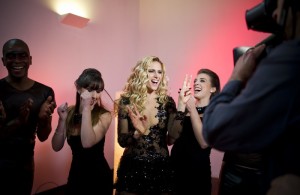
The final of the Portuguese national selection for the Eurovision Song Contest, Festival Da Canção, was held tonight. A total of five acts were vying to represent Portugal in Copenhagen, but only the favourite from the audience would have that honour and it was Suzy with Quero Ser Tua.
The five lucky acts who qualified from last week’s semi-final, those that received the most votes from the audience, were competing tonight to win the Portuguese ticket to Copenhagen.
This year is the 50th anniversary since Portugal first participated at
the Eurovision Song Contest so the show included some nostalgic moments
remembering some of the songs which have taken part at the Festival Da
Canção throughout the history.
The songs: (you can find more information on the participants in our Get To Know article)
1. Rui Andrade – Ao Teu Encontro (Rui Andrade & Marc Paelinck)
Opening the show was the only man in the competition, Rui Andrade. Ao Teu Encontro is a simple romance ballad whose lyrics has a positive and hopeful feeling that inspires us to overcome any challenge in a very poetic way. He sang sensitively and the instrumentation was breathtaking, but at the end it was a bit monotonous. Rui is a great singer and his powerful voice shined in the long notes but he needs a better pitch control. He was dressed very smart with a black suit, white shirt and a red tie. After the first chorus, three female backing singers appeared on stage, dressed alike in red, and they were behind him during the rest of the performance. The stage was lit in dark blue and the images of the screens showed a blue sky with some white clouds.
2. Catarina Pereira – Mea Culpa (Andrej Babic & Carlos Coelho)
For those who remember the song that Catarina performed at the Festival Da Canção in 2010, Mea Culpa sounds exactly like Canta Por Mim so it is a tried-and-tested formula that the viewers loved four years ago making Catarina winner of the televote. It is an uptempo dance song which has some ethno-pop elements, snazzy lyrics and nice instrumentation. The chorus is very catchy, lively and quite memorable with the potential to get stuck in people’s heads. She had the right energy on stage being capable of delivering a very entertaining performance with decent vocals and nice dance moves at the same time. She was accompanied by two male dancers and three backing singers (two women and a man) who were to the right of the stage, but also participated in the dance routine from time to time. The choreography was very well thought using all the space of the stage. Catarina wore a strapless red dress and the men who accompanied her wore red shirts and black trousers while the women wore black dresses. The stage lighting was red and purple and the images of the screens were yellow. Some fire flames were used at the end of the song.
3. Zana – Nas Asas da Sorte (Paulo Abreu Lima & Jan Van Dijck)
By combining different elements this song sounds like a unique and unconventional mix of traditional folk melodies, which sometimes reminds to the music from the Balkan lands, Oriental music, as well as tribal rhythms from primordial cultures. So, it sounds very traditional but renewing at the same time. She has a powerful voice and the vocal performance was flawless. The staging was beautifully balanced and absolutely thrilling with Zana standing on a platform while the four male backing singers were next to her, two on each side. Zana wore a lengthy green dress to the floor covering even the platform. Her backing singers were dressed very smart with black suits and white shirts. The stage lighting was constantly changing from yellow to blue and the images of the screens were green and blue.
4. Raquel Guerra – Sonhos Roubados (Nuno Marques da Silva & Nuno Feist)
This song is some sort of mid-tempo ballad with a big emotional punch which captivates the listener. The power of the song relied on Raquel’s vocal performance that embodies the emotional message of the song and, without being technically flawless, she sang convincingly and at an emotional level attuned to the lyrics. She was accompanied by four backing singers (two men and two women) who moved around the stage all the time. Raquel, who held her position in the centre of the stage throughout the whole performance, wore a shiny golden dress. The female backing vocalists wore long dark grey dresses and the men wore black suits and white shirts with golden ties. The stage was lit in dark blue and purple and on the screens one could see kind of a big white rose.
5. Suzy – Quero Ser Tua (Como A Lua É Do Luar) (Emanuel)
It is impossible to sit still when you are listening to this song which has a Latin feeling with some afro nuances that is quite infectious. Suzy has a powerful, sultry and warm voice and she sang in a relaxed style, loose and flowing with the rhythm. She was accompanied by two female backing singers to the right of the stage dressed in black. Two male backing dancers also dressed in black were at the back of the stage playing huge drums at the beginning of the performance. They also performed a great dance routine to which they added some maroon huge flags nearly the end of the song. There was another bare-chested man walking around the stage playing an African drum. Suzy wore a short black dress with a plunging neckline. On the screens we could see pink fireworks at the beginning of the performance and orange images during the rest of the song.
The show:
The two-hour show started at 22:15 local time (23:15 CET) and it was hosted by Sílvia Alberto and José Carlos Malato with Joana Teles reporting from the green room. The venue was the Convento Do Beato from Lisbon and the stage was installed in the main cloister of the former convent which is a magnificent piece of architecture with an imposing structure. Besides such an awesome backdrop, the stage also counted with some screens to both sides and in the back.
The guest for the opening act was Henrique Feist, the popular Portuguese singer and actor, who explained singing the history of the festival while the screen was black and white. He was accompanied by a large group of dancers. Then, the image turned into color and he continued singing about Portugal at the Eurovision Song Contest. His song ended with the hope that this year the country will qualify for the final.
Each performance of the five candidate acts was preceded by a video of the artists introducing themselves with a short biography and speaking about what they love, what they hate, what is their favourite food or their favourite movie and also showing their favourite pictures.
Lucia Moniz, who represented Portugal at the 1996 Eurovision Song Contest, performed the song Silêncio E Tanta Gente, which was the Portuguese entry in 1984 by Maria Guinot, as a tribute to all the singers, composers, musicians, producers, hosts… and all those who have been part of the Festival da Canção and have sadly passed away. Their pictures and names were showed on the screens and most of them received the warm applause from the audience.
Henrique Feist was back during the interval act to perform a medley which included a bit of each and every one of the forty-eight winning songs from the fifty-year history of the Festival Da Canção in just five minutes.
This year’s finalists also performed together some of the most memorable songs from the history of Festival da Canção in a tribute to António Calvário the first artist, who represented Portugal at the 1964 Eurovision Song Contest, in Denmark, with the song Oração, and Simone de Oliveira, Portuguese representative in 1965 with Sol De Inverno. After the performance, the two honorees appeared on stage.
Three former winners of Festival da Canção Anabela (1993), Liana (2000) and Filipa Sousa (2012) performed a medley of the songs that despite not winning the competition became big hits.
The results:
The final choice of the act that will represent Portugal in Copenhagen was entirely up to the Portuguese audience by televoting. It has been opened from last Sunday, the day after the semi-final, and during the whole week and until this evening the audience was able to vote, without limit, for their favourite among the remaining five finalists.
Three envelopes which contained the names of the three most voted acts were given to the hosts. They were: Catarina Pereira, Suzy and Rui Andrade. Later, these three were narrowed down to two with Catarina Pereira and Suzy being the favourites of the viewers.
And the artist who received the most number of votes from the audience and therefore will represent Portugal at the 2014 Eurovision Song Contest was Suzy with the song Quero Ser Tua who received the award from the previous winner Filipa Sousa.
Portugal at the Eurovision Song Contest:
Portugal debuted at the Eurovision Song Contest in 1964 having participated a total of 45 times. It has never won the competition with never even breaking into the Top 5, achieving its best placing in 1996 with Lucia Moniz who ended sixth on the scoreboard. The last time that Portugal participated at the Eurovision Song Contest was back in 2012 with Filipa Sousa and her entry Vida Minha. She did not manage to get through to the final finishing in thirteenth place at the second semi-final.



















